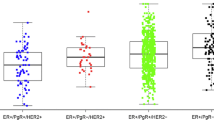Background
Many genetic traits common to aggressive breast carcinoma have been identified; yet little is known about the interrelationships of such traits during tumor development, especially in women prone to aggressive cancer. This study examined the expression of four biological markers associated with poor prognosis at each stage of breast cancer progression in primary tumors from women of lower economic status and assessed the relationship between these markers.
Methods
Archived primary breast tumors from 77 patients were assessed by immunohistochemical analysis for expression of human epidermal growth receptor 2 (HER-2), p53, vascular endothelial growth factor (VEGF), and e-cadherin, and the relationships between the expressions of these molecules were studied.
Results
Twenty-two (29%) patients had advanced (stage III or IV) disease. HER-2, VEGF, e-cadherin, and p53 signal were positive for 31 (40%), 58 (75%), 63 (82%), and 37 (48%) of patients, respectively. Among the markers tested, only p53 exhibited a significant association between expression and stage of the disease (P = 0.012). Expression of e-cadherin was positively associated with HER-2 overexpression (P = 0.004), and high levels of HER-2 occurred with strongly positive e-cadherin tumors. Marginally significant positive associations were observed between HER-2 and p53 signal (P = 0.06), and between disease stage and e-cadherin expression (P = 0.08).
Conclusion
The significant tendency toward expression of e-cadherin in conjunction with HER-2 overexpression in breast cancer is a novel finding. The association of p53 with more advanced stages of cancer emphasizes it as a key participant in metastatic processes in breast cancer.
Similar content being viewed by others
Author information
Authors and Affiliations
Corresponding author
About this article
Cite this article
Howard, E., Lau, S., Lyles, R. et al. Correlation and expression of p53, HER-2, vascular endothelial growth factor (VEGF), and e-cadherin in a high-risk breast-cancer population. Int J Clin Oncol 9, 154–160 (2004). https://doi.org/10.1007/s10147-004-0386-4
Received:
Accepted:
Issue Date:
DOI: https://doi.org/10.1007/s10147-004-0386-4



